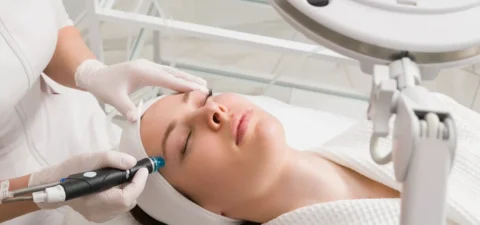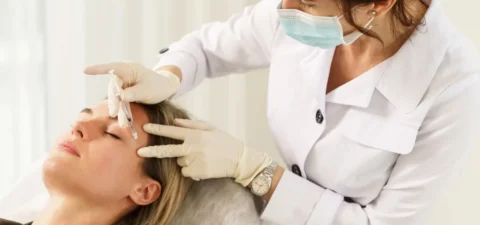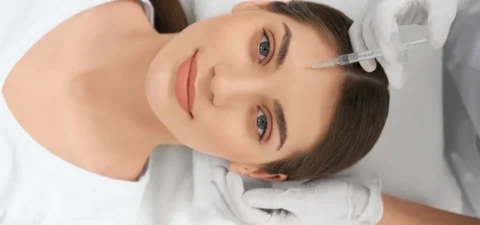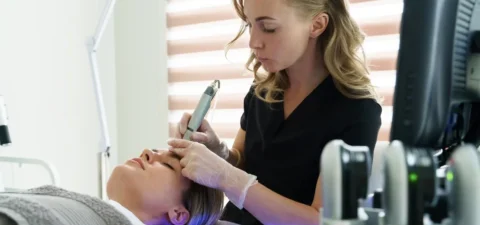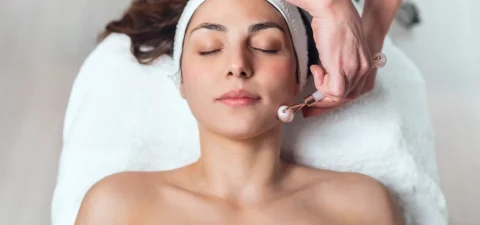For information only. Not meant as advice in any form. Please consult your medical professional or lawyer.
If you want to work in the beauty industry, it’s almost a must to have a license before you’re allowed to practice legally. Estheticians, in particular, are required to register their licensure to their state board or they can’t enjoy the benefits that come with being licensed. There are also some restrictions on the services that non-licensed estheticians can provide.
So what can you do without an esthetician license? Estheticians who haven’t applied for state licensure aren’t allowed to perform certain cosmetic procedures. However, there are services that they can still provide such as hair shampooing and hair braiding. Some estheticians may also work in a salon setting as receptionists, retail salespersons, managers, beauty marketers, hair and makeup consultants, or copywriters.
What Can You Do Without An Esthetician License?
One of the most popular jobs in the skincare and beauty industry today is an esthetician. According to a report by the Associated Skin Care Professionals, there are approximately 183,000 licensed estheticians in the United States and over 50,900 professionals were employed in medical spas or salons.
Estheticians are a type of cosmetologist who specializes in skincare treatments and procedures. If a licensed cosmetologist provides general services mainly for the beautification of face and hair, an esthetician is concerned with taking care of skin health and addressing a variety of aesthetic concerns.
Since the main responsibilities of estheticians revolve around providing enhancement and rejuvenation of the skin, you need a license to prove your skills and competence to safely and effectively perform the cosmetic procedures.
Career Options In The Aesthetics Field That You Can Take Without An Esthetician Specialty License
However, the amount of time it takes to get an esthetician license can be quite long. After graduating from an esthetician program or cosmetology school, you need to accomplish at least 260 to 1000 hours of training to qualify for state licensure and pass an examination. The number of hours usually varies per state but generally, it takes a lot of time and patience to wait until you become properly licensed.
The good news is that you can still work in a specialty salon or medical spa setting even without a license. A lot of aspiring estheticians are choosing to get employed by professional cosmetologists or dermatologists to gain relevant working experience while completing their required training hours. Here are some of the common job opportunities for non-licensed estheticians:
1) Beauty Consultant
Working as a beauty consultant is a great way to test your skincare knowledge as an esthetician. This job typically requires you to talk with clients and provide expert advice on skin care products, makeup, hair styling, and nail care. You can also make suggestions on how they can improve their appearance and offer personal makeover tips.
Most beauty consultants can work in various environments such as a department store, specialty salon, or cosmetic retail company. They may also work freelance and personally offer their services to interested individuals. Since a beauty consultant doesn’t perform any skin procedure or cosmetology service, they usually don’t require a license.
2) Beauty Writer
Non-licensed estheticians can also make their contributions to the beauty industry by working as a writer. Nowadays, it’s easy for anyone to start their own blog and publish articles about their own passions. Estheticians who are waiting for licensure may pursue a side hustle as a freelance writer and share their knowledge about all things related to skin care.
Being a beauty writer is also a good step to building your reputation as a skincare specialist in the industry. This allows you to provide advice and answer common queries as a way to help the general public with their skin concerns.
3) Cosmetic Sales and Marketing Representative
Estheticians may also kickstart their careers by working in the sales and marketing department of a cosmetics company or licensed salon. Every company that produces and sells skin care products would need experts in the field of esthetics and cosmetology to effectively market their brand.
As a sales and marketing representative, you’d be in charge of putting products in-store or selling them to salons, wellness centers, and medical spas. You may also be responsible for product demonstrations which is a good way to showcase your knowledge in cosmetics and skincare.
4) Cosmetic Product Buyer
Another alternative job option is to work as a product buyer for a spa or cosmetology salon. Generally, product buyers are responsible for making deals and negotiating with manufacturers to sell skin care items in-store. If you choose to work for a product manufacturer as a buyer, you may also have to find suitable skin care ingredients, which is where your technical knowledge as an esthetician will be useful.
5) Basic Hair Care Services Provider
Even without a cosmetology license, it’s still okay for estheticians to work in a beauty salon. While you may not be allowed to provide procedures, you can still offer basic services such as hair shampooing and hair braiding. You may also work as a freelance hair designer and assist cosmetologists with hair styling. You may also sell wigs and hair extensions as long as you’re getting paid for the product and you’re not putting them on the clients by yourself.
6) Spa Owner or Manager
Some states are not that restrictive when it comes to who can open med spas and salons, which is why estheticians can also start their own cosmetology establishments. However, since you still don’t have your state license, you’re required to employ licensed estheticians and cosmetologists who can provide the services. You may also need to hire a medical director if you want to offer medical or cosmetic procedures.
7) Salon or Spa Receptionist
Non-licensed estheticians may also work as a receptionist in a med spa or beauty salon. All you need is to have good interpersonal, organization, and customer service skills to be efficient in the role. As a receptionist, you’d be handling the majority of the day-to-day operations including scheduling appointments, welcoming clients, guiding patients to their treatment rooms, explaining services and procedures, and answering common queries.
Why You Should Get An Esthetician License
Although there are several job opportunities you can get without a license, you can maximize your potential as an esthetician if you obtain your state license and additional certifications. It’s also proof that you’re a skin care expert and can provide treatments safely and effectively. Here are some of the common reasons why you should apply for an esthetician license:
- Establish your reputation as a reliable facial specialist: A state license certifies that you’re highly trained and competent in performing certain skin treatments and procedures. You’d be able to work with more clients and help them with their cosmetic issues and skin concerns.
- Increase your relationship with clients: Another advantage of having an esthetician license is that you’re able to develop a close relationship with your clients. Having a license is one way to get people to trust in your skills so they’re confident that they’re in good hands during the treatment.
- Discover more opportunities for career growth: A licensed aesthetician can also pursue continuing education and get more training to become a master esthetician. Those who have enough experience may also become an esthetics or cosmetology instructor and teach their acquired skills and techniques to other aspiring professional estheticians.
Services You Can Provide With An Esthetician License
Estheticians aren’t medical doctors or dermatologists, but with a license, they can provide quality services and cosmetic procedures to help improve the appearance of the skin. They can also perform skin analysis and come up with a treatment plan that can enhance a client’s condition. Here are some of the services that you can carry out with an esthetician license:
- Facials
- Light to medium chemical peels
- Skin exfoliation and cleansing
- Aromatherapy
- Intense pulsed light therapy
- Laser hair removal
- Waxing
- Threading
- Eyebrow shaping
- Eyelash extension
- Makeup application
- Extractions
- Acne treatments
- Microdermabrasion
- Spray or airbrush tanning
Requirements to Apply for An Esthetician License
If you’re interested in working in the beauty industry as an esthetician, the first thing you should do is check the licensing requirements in your state. Generally, there are educational prerequisites that you need to meet, such as being a high school graduate or finishing at least 2 years of secondary education.
Upon obtaining your educational degree, you’d need to proceed with the general licensing process mandated by most states. Here’s an overview of the steps you have to take to become a licensed esthetician:
- Attend An Esthetician School or Cosmetology Program: You should enroll in an accredited esthetics or cosmetology program to receive formal training and study the general concepts related to skin care, sanitation, and salon spa management.
- Complete Required Esthetician Training Hours: After classroom-based coursework, you’d also have to accumulate hours of hands-on practice and on-the-job training. The number of hours differs per state but on average, estheticians are required to finish at least 200 to 1000 hours.
- Submit Proof of Training and Apply for Licensure: Upon finishing your training hours, you’d need to send proof to your state board and apply for licensure. You may need to take a practical exam which you need to pass to receive your esthetician license.
- Gain Additional Certifications: Some states require estheticians to pursue continuing education and obtain certifications to maintain the validity of their licenses. It may also be a requirement for license renewal once their credentials have expired.
Get Online Aesthetic Training Courses From FACE Med Store
While estheticians can still work in the beauty industry without a license, they can’t enjoy the same perks and provide the typical services that a certified skincare therapist can offer. To maximize your skills and potential, it’s recommended to apply for licensure so you can work with more clients and continue growing as an esthetician.
Enhance your aesthetician skills and knowledge with the help of our training courses from FACE Med Store. From cosmetic injections to basics of skincare and skin therapy, we have a wide selection of modules that can be useful for your career. To inquire about our courses and other products, call us today.
